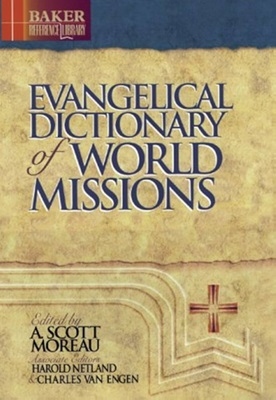
Moreau - Baker Evangelical Dictionary of World Missions - модуль BibleQuote
A. Scott Moreau - Baker Evangelical Dictionary of World Missions
Grand Rapids, MI: Baker Book House, 2000. – 1072 p.
ISBN 0-8010-2074-3 (hardcover)
In the more than twenty-five years since the last comprehensive mission dictionary (Concise Dictionary of Christian World Mission, 1971) was compiled the field of mission and missiology has undergone considerable changes. One of the changes has been a strengthening of evangelical involvement not only in missionary practice but in the study of mission on the formal level. The evangelical commitment to missionary work has been supplemented by a host of evangelical scholars who are studying the missionary task in new and fresh ways, bringing better analytical tools to our task without losing sight that it is the Bible which is the foundation of our work.
In recent years a plethora of new research materials has been produced, including biographical dictionaries, handbooks of mission agencies, encyclopedias of missionary statistics, prayer guides of missionary work around the globe, and dictionaries from a broader theological spectrum. However, there has been no reference work with an admittedly evangelical orientation encompassing the issues of missionary work and reflection into a single resource, and thus the motivation for the Evangelical Dictionary of World Missions.
The EDWM was designed to provide a readily accessible overview of mission which is irenic toward differing perspectives, interdenominational in outlook, and still firmly committed to the inspiration and authority of the Bible in orienting us to the task God has entrusted to the church. This is not a dictionary of evangelical missions, but a dictionary on world missions from an evangelical perspective.
This work is intended for educated lay people, pastors, students, students, missionaries, and mission specialists. It is part of the Baker Reference Library series, which includes The Evangelical Dictionary of Theology, The Evangelical Dictionary of Biblical Theology, Baker Encyclopedia of Psychology and Counseling, Evangelical Commentary on the Bible, and Baker Encyclopedia of Apologetics. It has the same orientation, format, and style as these works.
The EDWM was also designed to be comprehensive without being exhaustive. Literally thousands of possible entries were initially considered for inclusion. The approximately 700 content articles finally included represent the entire discipline and practice of missions. Including the articles on people and countries, there are over 1,400 entries, with an additional 250 cross-reference listings to enable easier access to the particular topics of interest to the reader. Opinions will always vary as to which articles may have been added or removed, and the reader is humbly requested to bear in mind the impossibility of pleasing everyone with the final list.
* * *
Pastoral Responsibilities
Pastoral responsibilities include guiding, comforting, correcting, encouraging, nurturing, protecting, healing, and worshiping. Caring for others, and being cared for by others, is not simply our biblical responsibility, but also a vital part of our evangelistic witness. Missionaries from Western countries are having less opportunities to serve as local-church pastors in Two-Thirds World countries. They still, however, find extensive opportunities for pastoral responsibilities.
The Methods of Pastoral Ministry
In regard to pastoral responsibilities, missionaries should remember that the biblical model for pastoral care and leadership clearly reflects the servant model. God called Abraham not just to become a great nation, but rather to become a blessing to the “nations” (Gen. 12:1–3). The Servant in Isaiah lived for the benefit of the people and not his own, and Israel was called to emulate this servanthood (Isa. 49:5–6; 53:4–6).
The incarnation remains the greatest example of the servant model (Luke 4:1–4; Phil. 2:5–11). Jesus explained his ministry as to serve rather than to be served (Mark 10:45; Luke 9:23–27). The Lord indicated that the pattern of leadership for people would not be that of the Gentile rulers who “lord it over” and “exercise authority over” those under their control. But, said Jesus, among his people the greatest would be the servant of all (Matt. 20:24–28).
Clear emphasis on the servant pattern of leadership and pastoral ministry comes through Jesus’ teaching in John 12:20–28. Only the seed that falls into the ground and dies brings forth great fruit. The servant pattern produces fruitfulness; the absence of the servant pattern leads to the tragedy of fruitlessness.
All pastoral responsibilities for missionaries should be based on and patterned after this servanthood model. Genuine pastoral leadership eschews the authoritative, paternalistic, manipulative, controlling, leader-dominated patterns too often seen even among Christian leaders. Biblical ways in pastoral leadership and ministry follow the pattern of servanthood.
Servant leadership expresses itself through relationship rather than position. The missionary refuses to consider himself or herself as the one in a position of authority but as one in a relationship of helping. The servant pastor seeks to serve rather than control; this model of pastoral ministry recognizes that equipping is better than performing. Through properly expressing the servant pattern of pastoral ministry, the missionary can live out the example of Jesus in his or her pastoral duties.
The Goals of Pastoral Ministry
The goals of pastoral ministry center in efforts to equip people first for their own relationship with God and then for the ministries to which God has called them. Both missionaries and national leaders have opportunities for this equipping ministry. The goal of equipping others follows the proper interpretation of Ephesians 4:11–13 and remains a primary goal of pastoral work.
Pastoral responsibilities include guiding and correcting. Gentle, sympathetic guidance including correction are among the more imperative functions of missionary leaders, and should be carried out in ways that are in keeping with local, culturally accepted patterns.
One of the foremost opportunities for pastoral responsibilities in today’s world relates to helping others develop pastoral skills, which multiplies the effectiveness of the missionary caregiver.
Pastoral responsibilities often include leading in worship. Worship leadership in cross-cultural situations demands sympathetic learning of the local ways in order that the worship will be done in culturally appropriate patterns rather than imported methods.
The Recipients of Pastoral Ministry
Missionaries engaged in pastoral responsibilities target different recipients for their ministries. One recipient group for pastoral ministry resides in the missionary’s own family. The missionary finds abundant opportunity to be a pastor to spouse and children. Also, the families and individuals within the mission organizations often need pastoral care—in times of tragedy, stress, discouragement, and the like. A missionary pastoral worker makes full use of such opportunities for such ministries.
A second recipient group for pastoral ministries rests with the leaders of the national organization. Rather than allowing this relationship to become adversarial, the wise missionary will commit himself or herself to serving as pastor to these leaders. Ministry to national leaders is among the most fruitful of all pastoral roles for missionaries.
A third recipient group for pastoral ministries includes the members of the churches. Missionaries will often be called on to minister to church members and their families. Western missionaries will exercise care in rendering pastoral ministry in the cross-cultural setting. Acts that extend love and concern may be overlooked if the missionary does not take fully into account the cultural realities of the society.
Ebbie C. Smith
Bibliography
- C. W. Brister, Caring for the Caregivers: Caring for Ministers and Missionaries; S. G. Lingenfelter and M. C. Mayers, Ministering Cross Culturally; K. O’Donnell, ed., Missionary Care: Counting the Cost for World Evangelization.





Комментарии
Пока нет комментариев. Будьте первым!